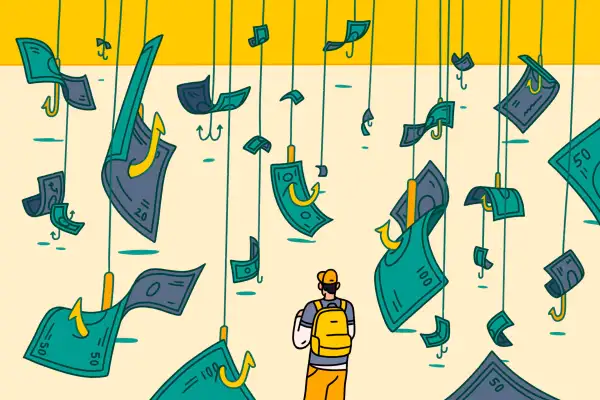Borrowers Are Getting Bombarded With Student Loan Relief Calls. It's a Scam

Let’s say your phone rings, and the caller tells you about the Biden Student Loan Relief program, which can help lower your monthly payments or even cancel your student loan debt. You just need to answer a few questions first.
Sounds great, right? There’s only one problem: the “Biden Student Loan Relief” program doesn’t exist.
That’s the story of dozens of borrowers who’ve been taking their experiences with these scammy calls to online forums, like Reddit, in hopes of getting useful advice.
Student loan debt relief scams aren’t new. In fact, consumer advocates say they were actually declining thanks to a 2017 operation launched by the Federal Trade Commission, which brought actions on 36 companies that had collected over $95 million in illegal fees.
So, why are they rising again?
Bonnie Latreille, director of research and advocacy at the Student Borrower Protection Center (SBPC), says that the scammers’ business model is designed to prey upon financial vulnerability.
“If you target people who are desperate for help, they'll do anything, including giving you all of their information,” Latreille says. “With the pandemic, there’s been unprecedented unemployment, people are struggling. So, scammers see it as an opportunity to jump,” she adds.
Plus, all the current talk about student debt cancellation proposals allows scammers to take advantage of consumers’ confusion.
Here’s what you need to know about student loan debt relief scams, and what to do if you fall for one.
Four common tactics used by scammers
Scammers can be sneaky, but luckily for us, they also have patterns. Look for these behaviors to spot a student debt relief scam before you hand over too much personal information.
The caller creates a sense of urgency
Betsy Mayotte, president and founder of The Institute of Student Loan Advisors (TISLA), says that although scam scripts may vary, one thing they all have in common is that they try to rush borrowers into signing up for their services.
“They use talking points to create a sense of urgency, like it’s on a ‘first come, first serve’ basis,” Mayotte says. The tactic pressures borrowers to act quickly and also stops them from researching the company's services.
Here’s an example from a voicemail left by one of the scammers to a Reddit user:
“We’ve been trying to reach you because you’re eligible for the federal student loan forgiveness program due to the changes made in 2020. It’s imperative that I speak with you as soon as possible since the student loan payment delay is about to come to an end…”
In this case, the scammer uses phrases, like “imperative” and “as soon as possible,” plus referencing the current federal student loan payment suspension, as the hook to get the borrower to act fast and not miss out on this “opportunity.”
The caller promises to help you lower your payments or get your loan balance forgiven for a “fee”
While there are some legitimate options that can help you lower your monthly payments, these can only be accessed through your federal student loan servicer, one of the nine companies that the government pays to manage the federal student loan portfolio. The same thing goes for student loan forgiveness.
So, if someone other than your servicer calls you offering lower monthly payments or forgiveness, Mayotte says to hang up the phone. “If they offer this right off the bat, without knowing more about your situation, that's absolutely a scam,” she adds.
If you’re having difficulty making payments, you can always contact your servicer directly to see if you qualify for an income-driven repayment plan to make your bill more manageable. Latreille, from the SBPC, says that under these plans, your monthly payments could be as low as $0, depending on your circumstances.
Another way to quickly spot a scammer is if they ask for money in exchange for these services.
Loan servicers "are there to help you for free," Latreille says. "It's never a company that says, ‘Pay us $49 a month to help,’ or whatever amount they come up with."
In other words, your student loan servicer will never charge you for applying to an income-driven repayment plan or a student loan forgiveness program.
The caller asks for your credentials
If a company asks for your federal student aid (FSA) ID or password, that’s a huge red flag.
“No servicer is ever going to ask you for that. The Department of Education is never going to ask you for that,” Mayotte says.
Why? Because your servicer and the Department of Education don’t need this information to access your account.
Scammers usually ask for this information to log into your account and change your contact information, so the servicer can’t contact you to notify you of any issues. They may also use this information to impersonate you and put your loans in forbearance.
Meanwhile, you think you're making your reduced monthly payment, but in reality the company is taking all the money, and nothing is going toward your student debt. “Then, the loan goes delinquent and they end up defaulting, and the borrower doesn't realize until their wages start getting garnished,” Mayotte says.
The caller prompts you to sign a document to act on your behalf
Some of these phony companies will ask you to sign a document to authorize them to renegotiate your student loan payments.
They’ll even use phrases like “we’ll take care of everything, so you don’t have to contact your servicer,” to make you think this is done as a convenience to you. But in reality, what you’re signing is a power of attorney, giving them the right to act on your behalf, legally.
Once they have this document, they can do anything from changing your account’s contact information to consolidating your loans to putting them in forbearance. And, in the worst of cases, they can use this power of attorney to get access to your bank account or other sensitive information.
Tips to protect yourself from a student loan debt relief scam
If you get a call from someone offering any sort of relief program for which you haven’t applied, Latreille says the best thing you can do is hang up. But if you have any doubts, she recommends asking if you can call them back before giving them any information. This will give you a chance to look up the company’s name and phone number, to ensure its legitimacy.
Mayotte also says to never share your FSA information with anyone, as the pin number can be used not only to alter your information but also to change your repayment plan without you knowing.
If the company contacts you via email, be sure to check out its website or company logo.
“A lot of times they'll use logos that are remarkably similar to a legit student loan servicer’s to confuse borrowers,” Mayotte says. “I've seen logos for these companies that even look a lot like the Department of Education’s logo,” she adds.
Finally, be careful of where and with whom you share your personal and credit information.
Student loan calculator websites with poor encryption are hotspots for scammers to gather the information they need to engineer their scam, including your name, email address, phone number — and even student loan balance. If you want to calculate your monthly payments, you can always do so by checking the Federal Student Aid website.
If you’re applying for any credit product, make sure that it’s from a company that has been around for long, or that has a solid reputation, so your information doesn’t end up in the wrong hands.
A few years back, the Consumer Financial Protection Bureau (CFPB) filed a lawsuit against Monster Loans, a California-based mortgage lender. The lawsuit stated that the company used their customers’ credit report information to run a student loan debt relief scam, affecting over seven million borrowers. The case is still pending resolution.
What to do if you think you’ve been a victim of a student loan relief scam
The first thing you need to do if you think you’ve fallen for one of these scams is to contact your bank or your credit card company to stop any payments going toward that company. Latreille also says to keep an eye on your credit report to see if there’s some unusual activity. If there is, contact the places where those transactions took place to dispute them immediately, so it doesn’t damage your credit.
Then, the next step is to contact your federal student loan servicer to explain what happened, as they usually have procedures in place to help borrowers in these situations.
“A lot of people feel ashamed or embarrassed," Mayotte says. "They don't want to report it because they feel like it makes them look like they weren't that smart, and that's not the case at all.”
If you signed a power of attorney, make sure you tell your servicer, bank and credit card company about this, so they can have it revoked immediately.
Once you’ve done all of that, you should also report the incident to the Federal Trade Commission, the CFPB or your district attorney, so they can look into it and hopefully prevent this company from scamming other consumers.
More from Money:
Should You Keep Paying Your Student Loans Even If They Might Get Forgiven?
A New Tax Break Could Push More Companies to Help Workers Pay Off Their Student Loans
Who's Making Those Annoying 'Your Car Warranty Has Expired' Calls, and Why Won't They Stop?

